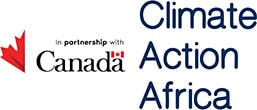Climate Action Africa launches initiative to develop climate risk management framework with the Africa Enterprise Challenge Fund (AECF)
As temperatures rise globally, extreme climate events such as droughts, cyclones, floods and heatwaves continue to negatively affect the entire African continent’s economy and society, particularly the key agricultural sector – which is having an acute impact on small businesses across the continent.
As Sub-Saharan African countries continue to contend with the challenges of climate change, the AECF recognized that small businesses require grants and funding to adapt to the disruption caused by natural disasters negatively impacting SMEs.
The AECF requested technical assistance through the Government of Canada’s Climate Action Africa (CAA) project to implement AECF’s recently approved climate risk management framework through climate screening tools and capacity building that are gender-responsive. These activities should reduce the climate risks and identify business opportunities that are climate-smart for SMEs.
Baastel, a Canadian-owned consulting firm, was selected as the Canadian Technical Expert to collaborate with AECF to implement this deployment.
In August, Baastel’s team leader Claudio Volonte, travelled to Kenya to begin consultation with AECF management and technical staff to discuss the current strategic direction of AECF’s climate risk management framework and identify approaches to deploy the technical assistance that suits the business models and due diligence of AECF and its SMEs clients investees.
Through this technical assistance, CAA will empower AECF staff, SMEs, African governments and civil society to understand and incorporate climate risk in their decision-making by implementing the AECF’s CRM – which could be used as a model in other countries in the region.
The AECF’s development of a climate risk management framework aims to increase climate resilience, climate-smart business opportunities and adaptation capabilities and, as a result, contribute to a sustainable future in Sub-Saharan Africa. More information on this technical assistance here.



